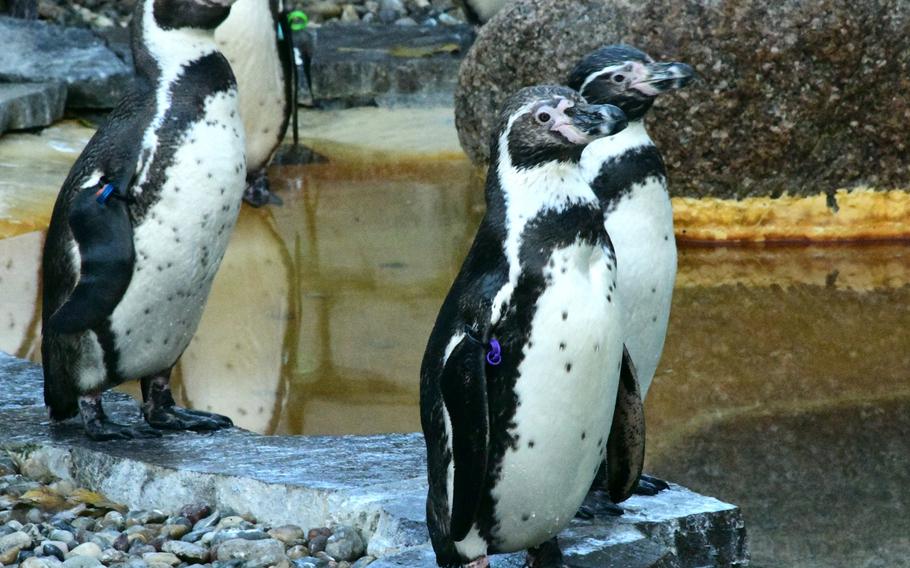
Humboldt penguins in their enclosure in the Luisenpark in Mannheim, Germany. A visit to see the penguins is a good reward for children who hang their pacifiers on the nearby Schnullerbaum - literally pacifier tree - as they try to kick the habit. ()
It was a little boy I met outside my home in Kaiserslautern, Germany, who made me aware of the existence of the Schnullerbaum, a genus of tree I’d never heard of in the States. I couldn’t understand what the 3-year-old was excitedly trying to tell me because he had a pacifier in his mouth. Heaving a sigh, his dad told me the family is going to the Schnullerbaum — literally a pacifier tree — in Mannheim, about an hour east of Kaiserslautern, before Christmas because Santa wanted their son to hang his pacifier on it and kick the habit.
The Schnullerbaum is a rite of passage for kids who are ready — or whose parents think they are — to stop sucking a pacifier. The tradition began in Denmark and has been embraced by Germans. There are Schnullerbaeume all over Germany, including major cities like Berlin, Munich and Frankfurt, according to my research.
Mannheim’s Schnullerbaum is in the Luisenpark, an expanse of green near the Neckar River where there’s also a small zoo, eating establishments, a winery, a playground with a zipline, a little “train” — actually a vehicle that doesn’t require a track — that will take you around the park, and gondolettas that you can pootle around the lake on. Neither of the latter was running the day I was there in November, but I did see a wedding party.
The woman in the ticket booth at the entrance to the park — yes, you have to pay to get in — wasn’t sure the Schnullerbaum still existed. Her grandkids had hung their pacifiers on it some time ago, she said. If it was still there, it would be down by the lake, behind the Humboldt penguins.
A 5-minute walk from the gate, I spied what looked not like a tree but a bush that had been allowed to become overgrown and unkempt — probably like the teenagers that the kids who’d hung their pacifiers on it years earlier had become. There were baby bottles in the middle of the bush and pacifiers on the inner and outer branches. Many looked like they’d been there for years, and some were obscured by dense foliage.
It was a little disappointing, but I visited the penguins, listened to the birds, walked around and was probably happier about coming than some of the kids who’ve parted with their pacifier in the park.
The next day, to redeem my faith, I set out to find another Schnullerbaum near Kaiserslautern. This one was near the children’s hospital in Landau and had been inaugurated in 2011 by the chief surgeon.
Bedecked with pacifiers, baby bottles and at least one Sophie the giraffe, Landau’s Schnullerbaum was well worth the hour’s drive over the hills south of Kaiserslautern. It caught my eye as soon as I entered the small park behind the hospital. No entry fee here, and there’s even a sign pointing to the Schnullerbaum to help you find it.
A plaque at the base identified the Schnullerbaum’s genus as Arbor liberatae, the liberating tree.
“Anyone who wants to give up their pacifier can come with their parents any time of year and add another blossom to the tree,” the plaque says.
Years later, they can come back and reminisce about their childhood, it says, because unlike most tree blossoms, “Pacifiers never fade.”
Zeitvogel.karin@stripes.com Twitter: @Stripeszeit
DIRECTIONS: Luisenpark in Mannheim is about 50 minutes east of Kaiserslautern. Put Ernst & Young in the GPS once you get to Mannheim, and the park entrance near the Schnullerbaum is opposite. There’s plenty of street parking nearby. The park is also accessible by public transportation — take the number 6 or 9 tram to Luisenpark/Technomuseum.
TIMES: The park opens at 9 a.m. year-round and closes at 4:30 p.m. from November to February. In the other months, it’s open until at least 6:30 p.m.
COSTS: Entrance in the winter is 4 euros for adults, 3 euros for students over 16, 2 euros for 6- to 15-year-olds, and free for 5 and under. Summer prices are roughly double that.
INFORMATION: Online: luisenpark.de Landau’s Schnullerbaum is in a small park behind the Vizentius Hospital, Cornichonstrasse 4, 76829 Landau in der Pfalz. Plenty of street parking nearby. There’s also a Schnullerbaum in Steinwenden, near Ramstein. You’ll find it at Friedhofstr. 28, 66879 Steinwenden, opposite the Siebenstark kindergarten. Access is free, and everyone is welcome to hang a pacifier on it.